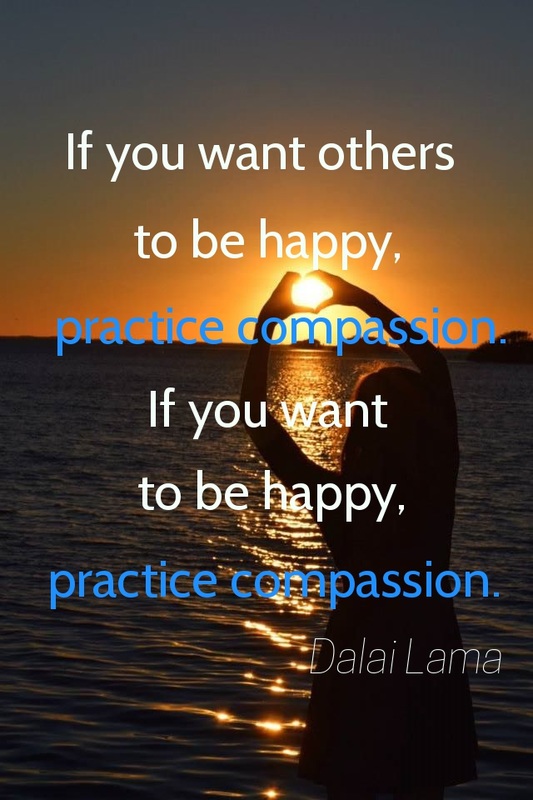Why is this? What is it about compassion that can bring happiness into your life? What does it even mean? What if I'm not by nature a very compassionate person, can compassion be cultivated?
The dictionary defines compassion as a feeling that arises when you are confronted with another’s suffering and feel motivated to relieve that suffering. Compassion is action oriented, it's a verb. It's bringing someone who is in need a meal, it's giving someone a ride, it's listening to someone going through a tough time, it's taking action to relieve someone's suffering in some way shape or form. We all at times practice compassion.
Suffering surrounds all of us in life. Compassion allows you to be with suffering without getting overwhelmed, without running away and without pretending that it doesn't exist.
I consider compassion to be a spiritual practice. Developing and cultivating compassion is an integral part of my spiritual practice. It's been said that of all the world's various religions the one thing they all have in common is the emphasis on the practice of compassion. Compassion is service. Compassion is love. Compassion is kindness.
Research suggests that acts of compassion activate the "pleasure centers" of the brain and our body secretes the bonding hormone oxytocin. This causes our heart rate to slow down, we are more resilient, our immune system is boosted and we have stronger relationships. Compassion makes us happier and healthier.
How compassionate do you consider yourself to be? In addition to practicing compassion for others, do you also practice self-compassion? How do we develop and cultivate compassion?
Compassion cultivation techniques can help us to navigate challenges. It helps us to experience the feelings by observing feelings without getting caught up in them or blocking them out.
Three keys to cultivating compassion:
1) Mindfulness
You can’t offer compassion if you don’t see the suffering around you. Mindfulness allows you to see what’s happening within and around you. Mindfulness is the awareness that arises through paying attention on purpose in the present moment, non-judgmentally.
Putting down the phone, shutting down the laptop, taking a few deep breaths, and observing your own body and mind. Do you feel tightness anywhere, is your mind replaying something you did “wrong,” or are you worrying about something you can’t control? Notice, label any feelings and breathe.
Then take a look around and notice what’s happening around you. What do you see? What do you hear and smell? Stopping and observing what's going on around you and within you is the first step toward cultivating more compassion.
2) Compassion for Yourself and for Loved Ones
Self-compassion can be a challenge for most of us. Have you ever paid attention to how you speak to yourself? A lot of times we are overly critical and use harsh words. You may think that you are letting yourself off the hook too easily. Coulda, woulda, shoulda done it better or differently, but research indicates the opposite. High levels of self-compassion have been linked to less procrastination, and people with self- compassion are more likely to take ownership for their own mistakes. Self-compassion is linked to greater happiness, more optimism and less depression.
In American society a lot of us aren't familiar with what self-compassion means. We are taught to take care of others, give back, and go, go, go. No one teaches us to tend to our own suffering. Taking time to recognize when we are suffering and need some tender loving care is as important, if not more important than practicing compassion for someone else. Your cup needs to be full first before you can extend help to others.
Consider extending yourself in service to someone in need of some compassion. It's the quickest way to feeling joy, fulfillment and happiness. When we ignore suffering, or we become so consumed with our own busy schedule that we miss the opportunity to practice compassion, we are missing opportunities to connect and foster relationships, to feel good about our selves and to feel happiness.
An easy and awesome way to practice compassion for yourself and others is through a compassion meditation (usually called a loving-kindness or metta). I've included below a simple loving kindness meditation sample for you to try. I love to do this particular meditation while I am walking my dog. It's simple to do and makes me feel great!
3) Compassion for Humanity
You may find it easy to be compassionate toward family, friends, and others like you, but it can be more difficult to have compassion for people you don’t know of for individuals who you don’t particularly like or identify with. This is where it's becomes important to practice recognizing our common humanity.
There is basic commonality between all humans. Consider that everyone wants to be happy. Everyone has a mind, a body, and a heartbeat. Everyone has dreams. Everyone has fears. Everyone wants to be loved. It helps to remember that we are all one. Whatever effects you and impacts you in turn impacts me.
This takes some practice, but it can change the way you interact with the world. It will make you feel more connected to the world. Practicing a loving kindness mediation also helps to cultivate compassion for all of humanity.
Loving-Kindness (Metta) Meditation
This meditation is the simple repetition of the following phrases:
May you be healthy and strong. May you be happy. May you be filled with ease.
-Directing them first toward someone you feel thankful for, someone who has helped you or someone who you feel unconditional love for.
-Next direct them toward yourself.
-Now direct them toward someone you struggle with, someone you are having a hard time with.
-Finally, direct them toward everyone in the Universe.
Compassion is a spiritual practice. Imagine what the world would be like if we all practiced more compassion. What do you think? Do you intentionally practice compassion? I would love to hear your thoughts on this post. Drop me a comment or send me an email.

 RSS Feed
RSS Feed
